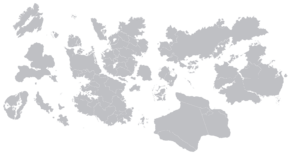Astyria
This article is incomplete because it is pending further input from participants, or it is a work-in-progress by one author. Please comment on this article's talk page to share your input, comments and questions. Note: To contribute to this article, you may need to seek help from the author(s) of this page. |
 | |
| Area | 118,614,500 km2 45,797,314.5 sq mi |
|---|---|
| Population | ~3,000,000,000 |
| Population density | 25.3/km2 65.5/sq mi |
| Demonym | Astyrian |
| Countries | List of countries |
| Languages | |
| Largest cities | List of cities in Astyria |
Astyria is a medium sized region encompassing 118,614,500 square kilometres. It is comprised of three large continental shelves, Hesperidesia, Lorecia and Teudallum, and is composed of thirty-four nations. Astyria is surrounded by vast bodies of water, notably the Mare Ferum, Mar de Aviz, Mederano Sea, Actlpacinarcticadian Ocean, Sea of Jajich and Eastern Ocean.
Name
The name "Astyria" has a disputed origin. Some nations in the area have alternative names for roughly the same geographic area, though Astyria is recognized globally as the accepted term. One theory is that it derives from the Old English word astyrian, meaning to disturb, because of the regular historical mass migrations and wars throughout the region.
History
Prehistory
Renaissance
Middle Ages
Early Modern Period
18th and 19th Centuries
20th Century to Present
No one knows. Way too many things going on. Whose turn is it to post on the thread, anyway?
Geography
Geology
Political Geography
21st Century
In the modern era, the political spectrum of Astyrian affairs is mostly divided between two political blocs, being the Astyrian Treaty Organisation and the Eastern Astyrian Treaty Alliance. These two factions comprise the majority of policy within the region and oftentimes, by default of their actions, dictate policy to the rest of the region. The foundation of these blocs are made of the two most premier superpowers within the region, the Republic of Kobolis and the Blackhelm Confederacy, with both increasingly at odds with one another as time progresses.
All political happenings between nations that are not party to either intergovernmental organization are somewhat seen as less important to the happenings of the blocs in the eyes of regional media, as the tensions between the ATO and EATA pacts are ripe for coverage. The East of Astyria, geographically the easternmost nations and coasts of Lorecia eastward, is generally seen as an area of high tension and a geographical boiling point where major powers in the region come together and often vie for military, economic and political power. Notably, the United Kingdom is a major participant in trans-Mare-Ferum operations and often extends its reaches well into the Atlpacinarcticadian Ocean.
Likewise, the Dangish Empire, a member-state of the Eastern Astyrian Treaty Alliance, has come at increasing odds with Aquitayne and Symphonia over the recent Humanitarian Operations in Pangus and Prudensia, where they - quoting the Osborne Doctrine as casus beli, threatened war over the United Kingdom's actions. This debacle is one of many such incidents over the past 50 years that have defined the Mare Ferum as a place of intensity.
The central western regions of Astyria, notably Northern Teudallum and southern Lorecia and the southern island chains are lesser known for military action. While on the other hand, southeastern Teudallum has been a hotbed of conflict with the EATA invasion of Terre Azure, the Casegene incursion in Agrincourt, and the endless warlord feuding and failed peacekeeping operations in Kamalbia, not to mention the Astyrian Liberation Army (ALA)'s terrorist bombing of Marqueville. Irrespective of Kobolis' military presence, the political atmosphere of the far western and central Teudallum nations, and southern Lorecian nations have usually been calm and diplomatic over the recent decades. The recent War of the Eastern Velar is the only major conflict in western Teudallum in the last decade, and is the culmination of a century of deteriorating political ties between Trellin's Sidereal Crown and Andamonia.
Astyrian Treaty Organisation
Eastern Astyrian Treaty Alliance
United Kingdom
Economy
Demographics
Language
Religion
Culture
